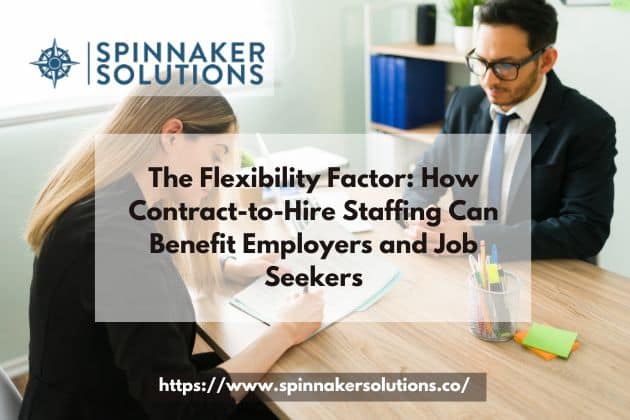Amidst the ever-changing landscape of today’s job market, both employers and job seekers find themselves in a ceaseless quest for inventive remedies to fulfill their distinctive requirements. Among these inventive solutions, the notion of contract to hire staffing has emerged as a notably embraced alternative. This dynamic strategy bestows a myriad of advantages upon both employers and job seekers, delivering an unparalleled degree of flexibility and benefits that frequently elude conventional hiring methodologies.
In the current flux of the job market, where rapid shifts are the norm, both employers and job seekers are unceasingly on the lookout for ingenious solutions to cater to their specific demands. Within this realm of innovative remedies, the concept of contract to hire staffing stands out as a widely embraced option. This dynamic approach ushers in a multitude of benefits for both employers and job seekers alike, presenting an unmatched flexibility and advantages that are often absent in traditional hiring practices.
The Changing Landscape of Employment
The conventional paradigm of enduring employment is undergoing a metamorphosis amidst the swift transformations in the business terrain. Enterprises are presently in pursuit of adaptable and multifaceted staffing remedies that can adeptly align with their ever-evolving requisites. This is precisely where the concept of contract-to-hire staffing steps into the spotlight. It proffers a distinctive proposition, affording companies the opportunity to evaluate the competencies and compatibility of a potential employee prior to making a steadfast commitment to a permanent position.
Unveiling the Flexibility Factor
For Employers
In an era where agility and adaptability reign supreme, the versatility presented by contract-to-hire staffing holds immeasurable value. This approach to staffing empowers employers to expeditiously occupy pivotal positions, particularly during moments of urgent necessity. The process initiates by enlisting a contractual employee who seamlessly collaborates with the existing team, effectively addressing immediate workload exigencies. This transitional phase functions as an elongated interview, affording employers the chance to assess the candidate’s performance, professional ethos, and resonance with the company’s ethos.
Furthermore, contract-to-hire arrangements facilitate the assessment of an individual’s compatibility with the role and the organization’s objectives. This in-depth evaluation eliminates potential risks associated with traditional hiring, where a candidate’s performance might not fully align with expectations once they assume a permanent position.
For Job Seekers
On the job seeker’s side, contract-to-hire roles provide an avenue to showcase skills and capabilities directly to potential employers. This staffing approach allows job seekers to immerse themselves within a company’s operations, contributing meaningfully and proving their worth over the course of the contract. It’s a mutually beneficial arrangement that often culminates in a permanent position offer for candidates who excel and align well with the company’s goals.
Additionally, contract-to-hire roles offer job seekers the opportunity to explore different work environments and industries without the long-term commitment. This freedom to test the waters and make informed decisions about their career path is a significant advantage, especially for those seeking a change or fresh challenges.
Navigating the Benefits
Seamless Skill Match
Contract-to-hire staffing ensures that employers secure candidates with the precise skills needed for a role. This approach minimizes the learning curve and allows for immediate contribution, enhancing productivity and efficiency.
Reduced Risk and Cost
The span of the contract term operates as a safeguard, diminishing the potential hazards linked to a full-time recruitment that might not unfold as projected. Employers hold the capacity to evaluate a candidate’s achievements prior to embarking on a lasting commitment, consequently curbing turnover rates and the ensuing expenditures.
Enhanced Employee Engagement
Job seekers who enter contract-to-hire roles often exhibit higher levels of engagement. The opportunity to prove themselves and earn a permanent position fosters a sense of dedication and commitment that can positively impact overall team morale.
Flexible Transition
The progression from a contractual role to a permanent position is seamless for both entities. The employee is already well-acquainted with the company’s functioning, thereby facilitating a more streamlined and effective assimilation process.
Embracing the Future: Making the Shift
As the business landscape continues to evolve, embracing contract-to-hire staffing is a strategic move that aligns with the demands of the modern world. This innovative approach ensures that employers remain agile, responsive, and equipped to handle fluctuations in the market. Simultaneously, job seekers gain a platform to showcase their abilities, explore diverse industries, and make informed career decisions.
If you’re an employer seeking adaptable staffing solutions or a job seeker looking for opportunities that offer both flexibility and potential for growth, contract-to-hire staffing could be the game-changing solution you’ve been searching for.
In conclusion, the flexibility factor offered by contract-to-hire staffing is unparalleled in the realm of modern employment. This mutually beneficial arrangement caters to the evolving needs of both employers and job seekers, presenting an innovative approach that maximizes efficiency, minimizes risk, and paves the way for long-term success.


